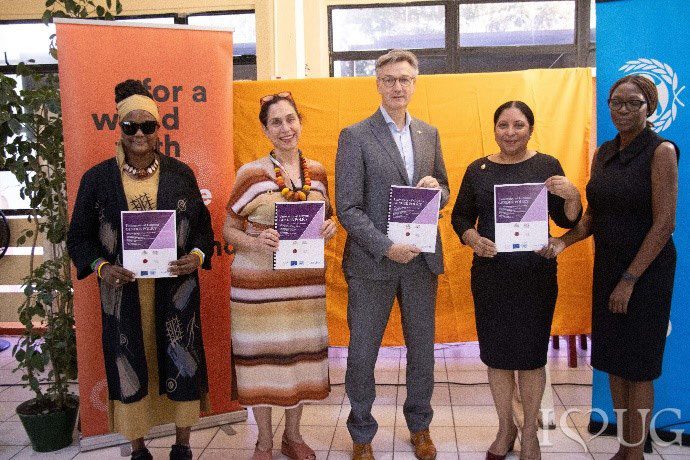In an effort to ensure that its staff and students irrespective of gender, have equal rights, responsibilities and development opportunities, at the institution, the University of Guyana (UG) has officially launched a Gender Policy.
In a release on Friday, the university noted that the Gender Policy, which it described as “carefully designed and robust,” is indicative of its commitment to the implementation of “sustainable strategies and programmes toward the advancement and implementation of equity, equality, non-discrimination and diversity among all staff and students and with its external stakeholders.”
It informed that the creation of the Gender Policy was supported by UG’s local and international development partners – the European Union (EU), UNICEF, United Nations Development Programme (UNDP) and the Women and Gender Equality Commission (WGEC).
Vice-Chancellor of the University of Guyana, Professor Paloma Mohamed, who spoke at the launch, said that the university was proud to be leading the way in ensuring that a carefully-designed policy was written and assured that a strong institutional framework is in place to ensure it is effectively and fully implemented.
She said that a “rigorous” process was followed by the university before the policy became final.
“The university’s procedures are quite rigorous, going through four committees whenever a policy is to be made.”
She explained that the Sexual Harassment and Sexual Miscon-duct Policy, a Mental Wellness Policy and an Inclusion, Diver-sity and Equity Policy, will also complement the Gender Policy. She thanked the EU, UNICEF, UNDP and the Women and Gender Equality Commission for their support in ensuring the policy was finalised.
Meanwhile, UN Resident Coordinator in Guyana, Yeşim Oruç. had this to say about the Gender Policy. “This product stands alongside other related outputs developed through various Pillars of the Spotlight Initiative in collaboration with the Government of Guyana, the Private Sector and other key stakeholders.”
She added: “I encourage the University of Guyana to quickly and fully implement the Gender Policy being launched today. A policy on paper is a remarkable product which is the culmination of the countless efforts of countless people. But even better than a policy on paper, is a policy in action – one that is so inextricably woven into the fabric of campus life that it becomes a defining characteristic.”
And the European Union Ambassador to Guyana, René van Nes, stated that the EU was very pleased to support the initiative, noting that the Gender Policy will help ensure that UG promotes gender equality, equity, non-discrimination and justice, and equal opportunities within the academic community for all staff and students.
“Ensuring equal rights for all individuals, regardless of gender, serves as a powerful catalyst for the progress and prosperity of our societies. It makes our nations not only richer but also more peaceful and more secure.”
He added, “This policy is a commitment to breaking down barriers and building bridges. It’s a promise to create a university where every one of you, regardless of gender identity feels empowered, respected, and ready to conquer the world. Let this be the beginning of a transformative journey within the university, radiating its positive influence into the wider Guyanese society.”
UG Deputy Vice-Chancellor for Institutional Advancement, Dr Melissa Ifill, who gave a brief overview of the policy said that the purpose of the Gender Policy included: the creation of a work and academic environment to ensure students, job applicants and staff members, all receive the same treatment irrespective of gender or gender identity; creation of a safe environment free from all forms of violence for all regardless of gender; ending discrimination based on gender and gender identities; raising awareness of gender equality, gender equity and gender justice; and mainstreaming gender awareness in the university’s operations.
Ifill also outlined the policy’s objectives which are: 1) To promote working and learning environments in which all staff and students are treated with dignity and respect; 2) to prohibit gender, gender identity and gender expression being used as a criteria or requirement to disadvantage any staff or student; 3) to outline guidelines to report, and procedures to investigate, allegations of discriminatory beha-viours or attitudes; 4) to promote a zero-tolerance policy for any form of gender-based violence that emanates from gender inequality; 5) to provide guidelines for responding to all reported incidences of gender-based discrimination or violence; and 6) to provide guidelines for responding to all reported incidences of gender-based discrimination or violence.
She further explained that the policy allows for data collection and the promotion of gender diversity, and mainstreaming gender in the curriculum. In this regard, the Institute of Gender Studies will work with faculties, schools, and colleges, to review their course/programme content to eliminate gendered value judgements and to appropriately integrate gender in all taught courses and research to promote a fair and inclusive gender environment in the classroom.





